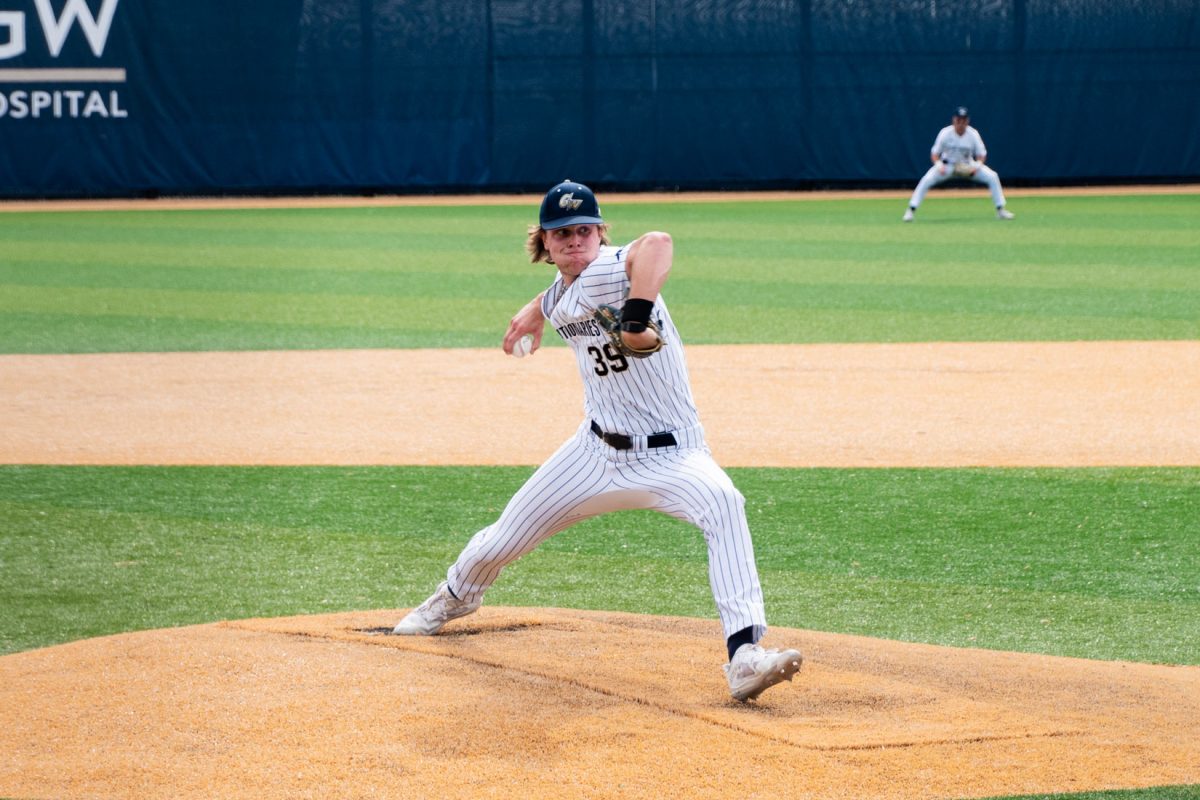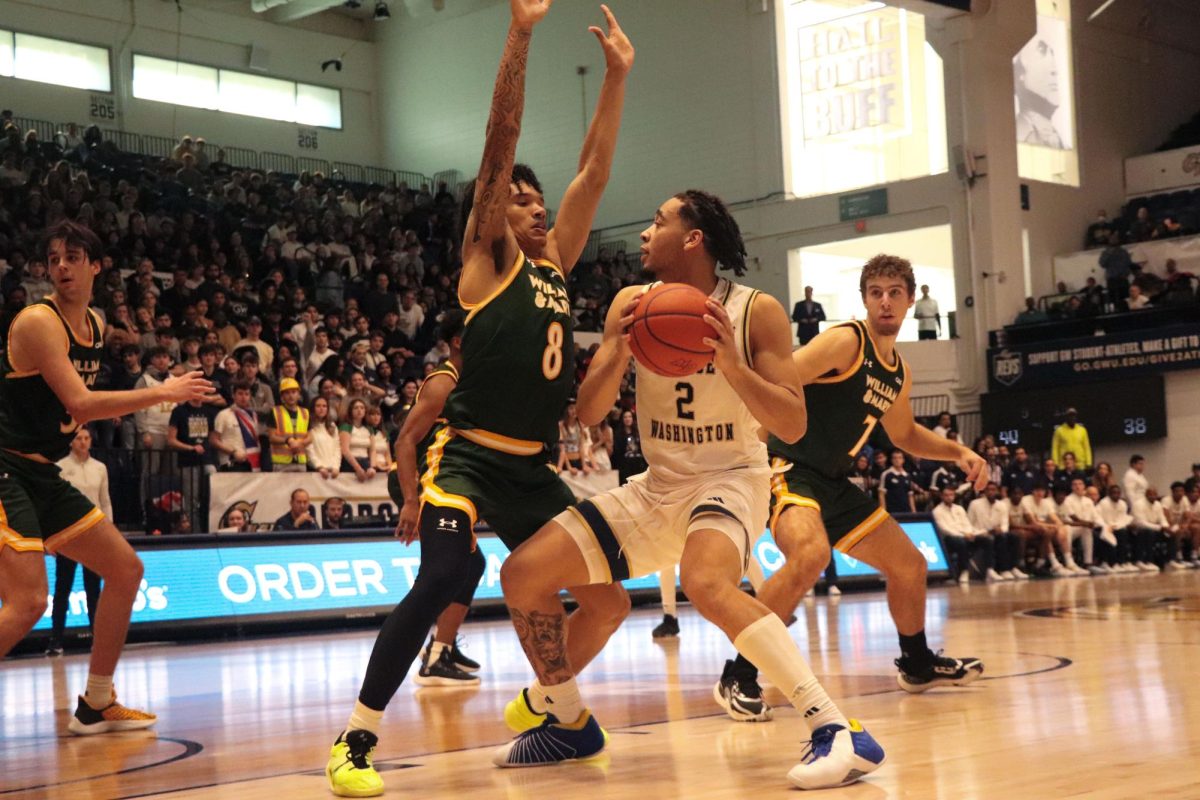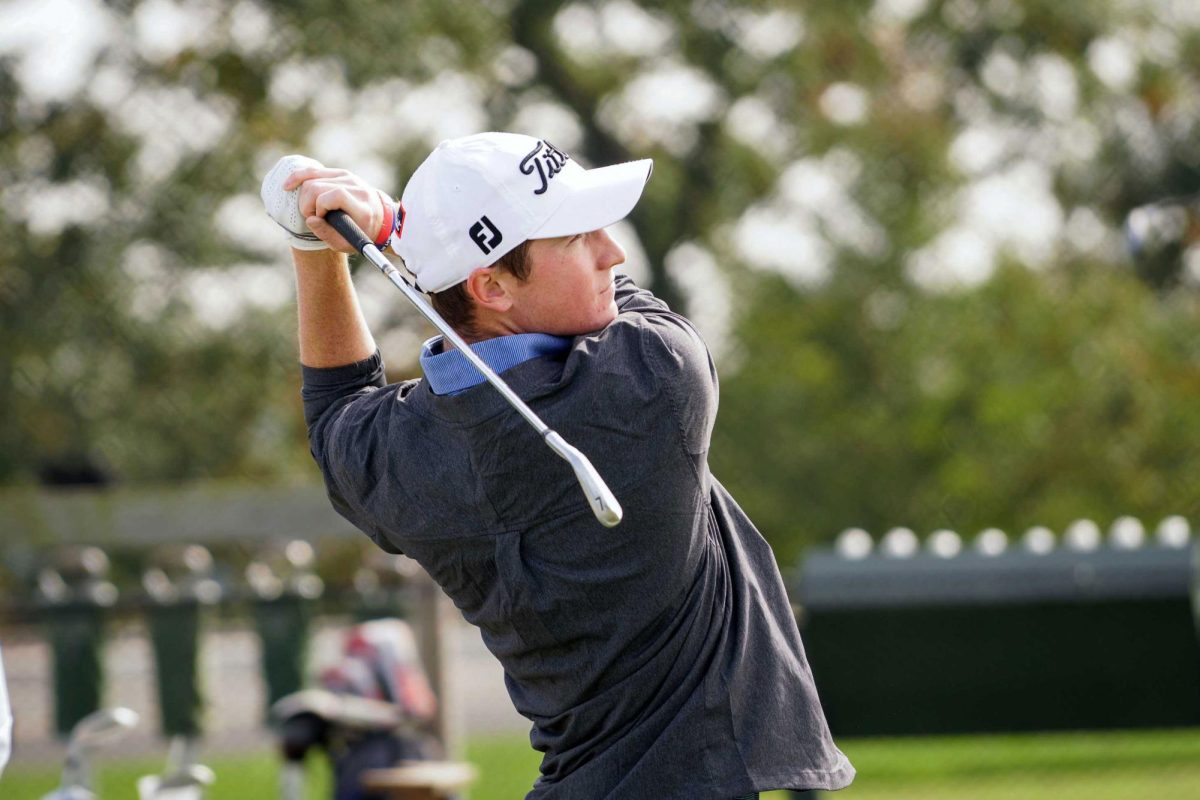At the start of GW’s Atlantic 10 Tournament game against Rhode Island, men’s basketball coach Karl Hobbs looks fairly calm. Sitting in his chair as he watches the opening tip-off, he is barely noticeable on the sideline. That lasts exactly five seconds.
With freshman J.R. Pinnock at the foul line, Hobbs jumps out of his seat, a chair no one will take but he will rarely sit in. He had walked out from the locker room a few minutes ago in a sleek, business-like suit, but his jacket is now off and he is already starting to sweat as much as the players on the court.
As Pinnock’s second shot goes through the hoop, Hobbs is out near mid-court, imploring his team to go into its full-court press defense with a combination of yelling, hand waving and jumping. A mild look of disgust comes over his face as he walks back down the sideline. They should have done it without him having to tell them.
This is how basketball begins and ends for Karl Hobbs, for whom intensity and emotion are as much a part of the game as the ball and the basket. His foot-stomping, cartoon-like antics are outdone only by his occasional tirades directed at players or referees. But after all, if he wanted a low-key career, he would have kept his job as a real estate appraiser 17 years ago.
“I think (how I act on the sidelines) is a product of my competitiveness,” Hobbs said. “I think it’s a product of my passion to win. And to me, there’s nothing more important than winning. I’m just so desperate to win, and I think sometimes I have to control it and not let that get the best of me.”
For the first two years of his GW career, which were also his first as a head coach, Hobbs had reason to feel desperate. The young team he inherited and has since revamped won only 12 games each season. But this year, with all but one player having developed under Hobbs’ system, there was a noticeable change. Success started early with a season-opening win at UNC-Charlotte and continued into conference play.
Students stormed the Smith Center court after a win over Dayton, and the Colonials were drawing near-sellout crowds by the end of the season. When it was over, GW had 18 wins and a National Invitation Tournament berth, and Hobbs had been given one of 15 National Association of Basketball Coaches regional Coach of the Year awards.
“I really think that this team overachieved to be a postseason tournament team. I think a .500 season would have been, ‘Okay, not bad,’ for this team,” Hobbs said. “Two more wins might have gotten us into the (NCAA) Tournament. That’s how close we were. And what I want the kids to understand is that there is such a fine line.”
The Colonials take an early lead in this game, their first of the conference tournament. But Hobbs is hardly satisfied, or if he is, no one in the U. Dayton Arena can tell. As he watches his team on defense, he becomes visibly frustrated. He is shorter than most of his players but stomps his feet hard enough to catch everyone’s attention.
By this point, midway through the first half, Hobbs’ voice cracks into a screeching sound. Minutes later, he calls freshman Ricky Lucas over to give him instructions before yelling out, “And would somebody please play some GOD DAMN DEFENSE!”
The score was 38-19 GW.
The intensity Hobbs shows as a coach has a clear impact on his players, who feed off both Hobbs’ and their own emotions. Two of his best players, junior T.J. Thompson and sophomore Pops Mensah-Bonsu, were coming off the bench by the end of the year because they get so excited at the beginning of games, causing Mensah-Bonsu to pick up quick fouls and affecting Thompson’s shooting touch.
When the Colonials were at home this season, sparked by the support of their fans, they were nearly unbeatable, finishing 11-1 at the Smith Center. Playing on the road, though, players looked “like they (were) going to the Museum of Science,” as Hobbs once put it, and had trouble playing with the fire they showed at home.
“(Hobbs) never loses his emotion, and that feeds into us,” Thompson said. “He’s always just real excited and everything, and that’s what we try to do is just feed off coach.”
But don’t be fooled. Hobbs is not quite as angry as he may seem.
“There are times when some of it is calculated to motivate the players to play a little bit harder,” Hobbs said. “Some of it is to get the attention of the officials. At times, it’s calculated. I can honestly say that. And I try to use it to my advantage to help us win a basketball game.”
The Colonials are winning this basketball game, and in the closing minutes, their lead over the Rams is approaching 30 points. The fact that Hobbs’s intensity is unaffected by the score is not only noticeable but almost comical to some of his players. Sitting on the bench, Thompson, sophomore Mike Hall and freshman J.R. Pinnock watch and laugh.
They try not to show it, but as he stands next to them, Thompson finally says, “Hey coach, I think we got this one. You can sit down now.”
Hobbs cannot hold back a smile.
“We gotta try and keep it down and not let him know that we’re happy, because he doesn’t want us to be too happy,” Thompson said. “He doesn’t want us to embrace success. He wants us to work hard for it.”
Part of playing for Hobbs, Thompson said, is also knowing when to be happy and when an untimely laugh might earn you an extra sprint. This means learning how to observe Hobbs’ moods.
“It’s hard to read him, and you have to read him the right way, because if we’re happy and he’s mad that’s not a good combination,” Thompson said. “You gotta read his moods. Normally you can read him within the first five minutes of practice and see how he is, but he’s normally never in a good mood when it comes to basketball because he’s just so passionate about it.”
Hobbs’ moods can also vary after games when he meets with members of the media, whose work he scrutinizes carefully.
“Most people don’t know Omar Williams, most people don’t know Carl Elliott, but what they know is what the media writes,” Hobbs said. “And I’m very protective of our players. Whenever something negative is written about them, I respond … I’m really concerned about the image of our players and our program, and the media helps shape that image.”
The following evening against Xavier, the Colonials never hold a lead.
Hobbs begins to lose his voice a little earlier in this game than in the last one and is undoubtedly more frustrated, at times taking long walks to the baseline and back to exhale. After Xavier’s Lionel Chalmers hits a three-pointer to give his team a 19-8 lead, Hobbs is incredulous at his team during the ensuing timeout.
“We’re leaving their two best players open every fucking time! HOW DOES THAT HAPPEN?”
Hobbs becomes equally frustrated with the referees, who offer GW no help with the Musketeers. Snapping his finger at his assistants during the game, he yells, “What’s that official’s name?”
After scrambling through their notes, one of them replies, “Frank.”
“FRANK!”
He would pick up a technical foul later after slamming the scorer’s table.
“You have to show the officials respect, and you have to stay in their ear constantly throughout the game,” Hobbs said. “What you’re trying to do basically is if it’s a close call that could go either way, you’re trying to influence the official … And I try to go as close to that line as possible without crossing it.”
The line Hobbs and his team did cross this year was one of respect in the A-10, putting the Colonials in position for a banner year in 2005 with all but one of their players returning. But more than anything, this year’s Colonials took on the personality of their coach.
In the final minute of the game, Hobbs puts on his jacket and starts addressing his players on the bench, ignoring what is happening on the court, where his team’s NCAA Tournament hopes are about to come to an end. He gives words of encouragement, assuring them that the loss doesn’t take anything away from what they accomplished this season. But his final words are his strongest.
“But you remember this feeling when you go to the weight room, and think about what this feels like,” he says. “When you go to the weight room, REMEMBER WHAT THIS FEELS LIKE.”







